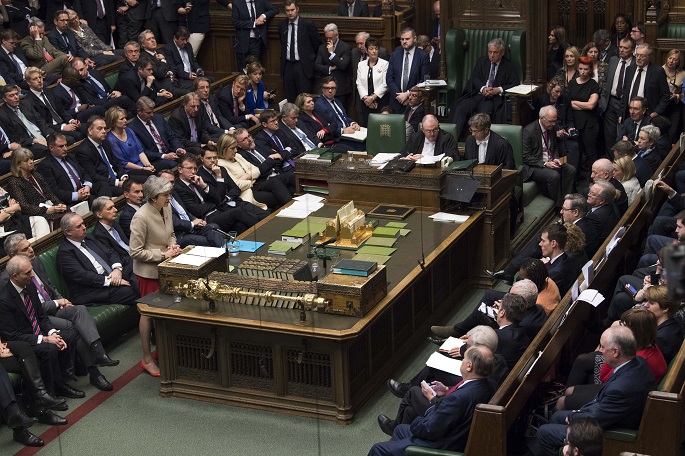British MPs reject all 4 Brexit options
Published : 02 Apr 2019, 00:46
Updated : 02 Apr 2019, 01:18
British lawmakers on Monday voted to turn down all the four proposed Brexit options on the table, the second time since Friday that none of MPs' proposed Brexit options wins clear backing in the House of Commons.
MPs voted down all the four Brexit proposals chosen by House Speaker John Bercow in a bid to break the current Brexit deadlock. The British government has until April 12 to decide how Britain will leave the European Union (EU).
None of the four alternatives to British Prime Minister Theresa May's Brexit deal receives support from a majority of MPs in the second round of "indicative vote," which kicked off at around 20:00 BST on Monday and whose results were announced at around 22:00 BST.
MPs voted 261 to 282 to reject the proposal that the United Kingdom stays in the single market and negotiates the customs union with the EU.
The customs union proposal means Britain's close trading relations with the European Union after Brexit.
Under the Common Market 2.0 proposal, the UK would leave the EU, but retain the free flow of goods and make contributions to the EU budget.
Meanwhile, MPs also voted 191 to 292 to turn down the idea to give lawmakers power to stop a no-deal Brexit.
They voted 280 to 292 to oppose the proposal that confirmative public vote will be conducted on Brexit.
MPs also voted 273 to 276 to reject the proposal to negotiate permanent customs union with the EU.
None of the Monday votes on the proposals are legally binding, meaning it will be up to the British government if they act on the results.
Conservative MPs have been given a free vote, but cabinet ministers will be told to abstain. The opposition Labour Party ordered its MPs to vote for the customs union.
Prime Minister May is seeking a fourth vote on her Withdrawal Agreement, which has been rejected by the parliament three times since January.
The first round of unbinding "indicative vote" was conducted on March 27, in which none of MPs' eight proposed options secured a majority, but among them, the proposed options about a customs union with the Europan Union and a referendum on any deal received most support from the lawmakers.
Many of those eight options have returned for round two, but some have been replaced with new alternatives.
The prime minister, who is struggling to hold her party together, warned Sunday night that she faced resignation and a split in the Conservative Party if she agrees to pursue a "soft" Brexit this week.
The British cabinet is expected to meet on Tuesday morning to consider how to proceed with the vote outcomes amid speculation about possible resignations, a general election or change of Tory leader.
"My party refuses to compromise, I regret therefore that I can no longer sit for the party," an emotional Conservative MP Nick Boles said in the parliament chamber shortly after the announcement of the vote results to quit the party.
"I accept that I have failed," he added.
British cabinet ministers were once again reportedly instructed to boycott the votes as MPs make a second attempt to coalesce around an alternative deal.
May had suggested she would "engage constructively" with the indicative votes process.
May's plan that she negotiated with the EU has been rejected twice by historic margins in Parliament.
The withdrawal agreement section of her deal was voted down again by MPs on Friday.
Mrs May now has until 12 April to either seek a longer extension from the EU to take a different course or decide to leave the EU without a deal.


